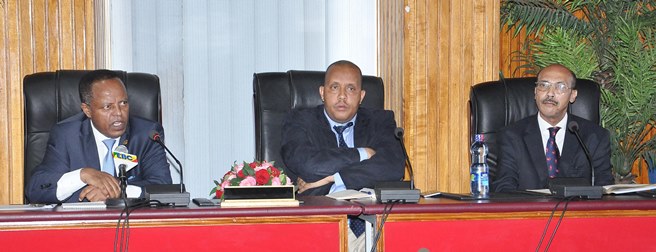
On 12 October 2016, the Ministry of Foreign Affairs and the Ministry of Government Communication Affairs Office briefed the diplomatic community and representatives of international organizations in Addis on current political developments in the country and the reasons for the declaration of a State of Emergency.
State Minister for Foreign Affairs, Ambassador Taye Atske-Selassie, and the Minister for Government Communication Affairs Office, Getachew Reda, detailed the current situation, the reasons behind the declaration of the State of Emergency and its scope, and highlighted planned political reforms to encourage restoration of peace and security and the creation of a positive climate for continued momentum for development.
Minister Getachew Reda emphasized that the State of Emergency had been put in place to allow full play for political engagement to address the protests, frustrations and concerns raised by the youth. It was not aimed at addressing people’s grievances through security measures; it had been put in place to address emerging, organized, mobile and coordinated security threats against peoples’ lives and the security of the country.
He also emphasized that the State of Emergency did not mean a blanket ban on all activities. It provided conditional controls on certain areas and activities as needed. In such score, the Minister once again stressed there is no blanket ban on communications, freedom of movement and imposition of curfew.
Ambassador Taye noted protests and disturbances over the last six months were unprecedented. These included legitimate grievances but regrettably in some cases the concerns of the people were hijacked by some extremist elements aiming to take control of the protests as a means towards taking unconstitutional control of state power.
It was in this context that the government examined the ongoing and future prospects of the security situation. It was resolved to bring peace and stability. This was needed to advance political reforms for the greater benefit of the people and to reverse the violence that had led to loss of life and destruction of property.
Ambassador Taye emphasized that the declaration of a State of Emergency should be seen in the light of the urgent need to protect the national life of the people and preserve the territorial integrity and sovereignty of the country in the face of increased insecurity. The point had been reached when ordinary law-enforcement measures were insufficient when faced by the security threats posed by armed anti-peace elements financed and encouraged by external forces.
The State of Emergency was a strategic choice to bring back immediate peace and security as well as encourage the country onto a course of political reform in response to peoples’ grievances and questions.
In the question and answer session that followed, Ambassador Taye underlined that the purpose of the State of Emergency was first and foremost the protection of the safety and security of the people, and to reverse the course of the current of chaos, hatred, tension and insecurity in the country. He emphasized the six-month State of Emergency included respect for fundamental human rights; as well as for the diplomatic and consular rights enshrined in the Vienna Convention. The declaration did not in any way stifle the normal exchange of ideas and discourse. It would only affect information inciting violence and hatred. Referring to the proposed political reforms, Ambassador Taye explained that the Government was committed to create conditions for an inclusive nation-wide dialogue on a wide range of national issues in order to bring lasting peace and security, and encourage the country’s rapid economic growth.




